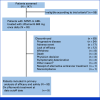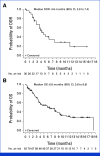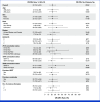The following represents disclosure information provided by authors of this manuscript. All relationships are considered compensated unless otherwise noted. Relationships are self-held unless noted. I = Immediate Family Member, Inst = My Institution. Relationships may not relate to the subject matter of this manuscript. For more information about ASCO's conflict of interest policy, please refer to www.asco.org/rwc or ascopubs.org/jco/authors/author-center.
Open Payments is a public database containing information reported by companies about payments made to US-licensed physicians (Open Payments).
Eunice S. Wang
Consulting or Advisory Role: AbbVie, Kite/Gilead, Novartis, Kura Oncology, Daiichi Sankyo/UCB Japan, Rigel, Schrodinger, Qiagen, Syndax, Blueprint Medicines, Johnson & Johnson/Janssen, SERVIER, Takeda, Stemline Therapeutics, Ryvu Therapeutics
Speakers' Bureau: Pfizer, Astellas Pharma, Daiichi Sankyo/UCB Japan
Other Relationship: UpToDate
Pau Montesinos
Consulting or Advisory Role: AbbVie, Pfizer, Daiichi Sankyo, Jazz Pharmaceuticals, SERVIER, Otsuka, Kura Oncology, Sumitomo Pharma Oncology, Janssen
Speakers' Bureau: Otsuka, Celgene, Daiichi Sankyo
Research Funding: Celgene (Inst), Janssen-Cilag (Inst), Pfizer (Inst), Servier (Inst), AbbVie (Inst), Daiichi Sankyo Europe GmbH (Inst)
Travel, Accommodations, Expenses: Amgen
James Foran
Stock and Other Ownership Interests: Aurinia Pharmaceuticals
Consulting or Advisory Role: Syndax
Research Funding: Kura Oncology (Inst), Sellas Life Sciences (Inst), Celgene/Bristol Myers Squibb (Inst), Chordia Therapeutics, Takeda (Inst), Roivant (Inst)
Travel, Accommodations, Expenses: PeerView
Harry Erba
Consulting or Advisory Role: Agios, Astellas Pharma, Amgen, Celgene, Daiichi Sankyo, GlycoMimetics, Immunogen, Incyte, Jazz Pharmaceuticals, MacroGenics, Novartis, AbbVie/Genentech, Janssen Oncology, Pfizer, Trillium Therapeutics, Takeda, Kura Oncology, Bristol Myers Squibb/Celgene, Sumitomo Dainippon Pharma Oncology, Schrodinger, Stemline Therapeutics, SERVIER
Speakers' Bureau: Agios, Incyte, Jazz Pharmaceuticals, Novartis, Bristol Myers Squibb Foundation, AbbVie, SERVIER, Syndax
Research Funding: AbbVie (Inst), Agios (Inst), Amgen (Inst), Daiichi Sankyo (Inst), FORMA Therapeutics (Inst), Gilead/Forty Seven (Inst), Immunogen (Inst), Jazz Pharmaceuticals (Inst), MacroGenics (Inst), Novartis (Inst), PTC Therapeutics (Inst), AbbVie (Inst), GlycoMimetics (Inst), ALX Oncology (Inst), SERVIER (Inst), Aptose Biosciences (Inst), Sumitomo Dainippon Pharma Oncology (Inst), Ascentage Pharma (Inst), Kura Oncology (Inst), Oryzon Genomics (Inst), Taiho Oncology (Inst)
Other Relationship: GlycoMimetics, Celgene, Bristol Myers Squibb/Celgene, Daiichi Sankyo/UCB Japan
Uncompensated Relationships: Daiichi Sankyo
Eduardo Rodríguez-Arbolí
Consulting or Advisory Role: Kura Oncology, Syndax, Laboratoires Delbert, Astellas Pharma, SERVIER
Travel, Accommodations, Expenses: Gilead Sciences, AbbVie, Jazz Pharmaceuticals, SERVIER
Florian H. Heidel
Honoraria: Silence Therapeutics, Kartos Therapeutics, AbbVie, Novartis, Celgene/Bristol Myers Squibb, AOP Orphan Pharmaceuticals, Prelude Therapeutics, GlaxoSmithKline, Merck, Janssen
Consulting or Advisory Role: Novartis, Celgene/Bristol Myers Squibb, Kartos Therapeutics, AOP Orphan Pharmaceuticals, Silence Therapeutics, Prelude Therapeutics, Janssen, GlaxoSmithKline, Merck
Research Funding: Novartis, CTI, Celgene/Bristol Myers Squibb
Jessica K. Altman
Consulting or Advisory Role: GlycoMimetics, Kura Oncology, AbbVie, Astellas Pharma, BioSight, Bluebird Bio, Stemline Therapeutics, Curio Science, Gilead Sciences, MD Education, Rigel, Aptitude Health, HMP Education, VJ HemOnc, Treadwell Therapeutics, Dark Blue Therapeutics, Curio Science, Daiichi Sankyo/Lilly, Johnson & Johnson/Janssen, Kura Oncology, Omeros, Ascentage Pharma, Syndax, Onviv
Research Funding: Astellas Pharma (Inst), Pfizer (Inst), Agios (Inst), Bristol Myers Squibb (Inst), Boehringer Ingelheim (Inst), Biosight (Inst), Kura Oncology (Inst), AbbVie (Inst), Amgen (Inst), Kartos Therapeutics (Inst), Aptose Biosciences (Inst), ALX Oncology (Inst), Immunogen (Inst), Kura Oncology (Inst), Loxo (Inst), Telios (Inst), Takeda (Inst), Shenzhen TargetRx (Inst), Blossom Hill (Inst)
Travel, Accommodations, Expenses: Astellas Pharma, Daiichi Sankyo
Other Relationship: NCI, Imedex/HMP, PeerView, NCCN
Uncompensated Relationships: Kura Oncology
Uncompensated Relationships: Astellas Pharma
Uncompensated Relationships: Daiichi Sankyo/Lilly
Maria R. Baer
Research Funding: AbbVie (Inst), FORMA Therapeutics (Inst), Kite, a Gilead Company (Inst), Takeda (Inst), Kura Oncology (Inst), Ascentage Pharma (Inst), Curadev (Inst), Sumitomo Pharma Oncology (Inst)
Lionel Ades
Honoraria: Celgene, AbbVie, Jazz Pharmaceuticals, Novartis
Research Funding: Celgene (Inst)
Kristen Pettit
Consulting or Advisory Role: Merck, AbbVie
Travel, Accommodations, Expenses: Merck
Pierre Peterlin
Honoraria: AbbVie, Astellas Pharma, SERVIER
Consulting or Advisory Role: Jazz Pharmaceuticals, AbbVie, Astellas Pharma, Daiichi Sankyo/Lilly, Daiichi Sankyo/Lilly
Speakers' Bureau: AbbVie, BMS GmbH & Co. KG
Research Funding: AbbVie (Inst), Astellas Pharma (Inst), SERVIER (Inst)
Travel, Accommodations, Expenses: Daiichi Sankyo Europe GmbH, AbbVie
Cristina Papayannidis
Consulting or Advisory Role: Pfizer, Daiichi Sankyo Europe GmbH, SERVIER, BMSi, Blueprint Medicines, Istituto Gentili, Otsuka, Menarini, AbbVie, Amgen, Astellas Pharma, MSD, Jazz Pharmaceuticals, Janssen, Syndax
Roland B. Walter
Consulting or Advisory Role: Bristol Myers Squibb/Celgene/Juno, Orum Therapeutics, AbbVie, BerGenBio, GlaxoSmithKline, Kura Oncology, Adicet Bio, WUGEN, Inc
Research Funding: Amgen (Inst), Pfizer, Jazz Pharmaceuticals (Inst), Aptevo Therapeutics (Inst), MacroGenics (Inst), Immunogen (Inst), Janssen Research & Development (Inst), Kura Oncology (Inst), Kite/Gilead, Vor Biopharma (Inst)
Mithun V. Shah
Honoraria: Omeros
Research Funding: Celgene/Bristol Myers Squibb (Inst), AbbVie (Inst), Kura Oncology (Inst), Marker Therapeutics (Inst), Astellas Pharma (Inst)
Suresh Balasubramanian
Consulting or Advisory Role: Kura Oncology
Speakers' Bureau: Alexion Pharmaceuticals, Geron, SERVIER
Research Funding: Kura Oncology (Inst)
Julie Bergeron
Honoraria: Amgen, Jazz Pharmaceuticals, AbbVie, Astellas Pharma, SERVIER, Daiichi Sankyo, Paladin
Consulting or Advisory Role: Multiple, Kura Oncology
Travel, Accommodations, Expenses: Amgen
Yazan F. Madanat
Honoraria: Blueprint Medicines, OncLive/MJH Life Sciences, Stemline Therapeutics, Taiho Oncology, Bristol Myers Squibb, Kura Oncology, GERON, SOBI, Rigel, SERVIER, Curio Science, Cogent Biosciences, AbbVie
Consulting or Advisory Role: Geron, Kura Oncology
Travel, Accommodations, Expenses: Blueprint Medicines, MorphoSys
Gail J. Roboz
Consulting or Advisory Role: Janssen, Amgen, Astex Pharmaceuticals, Celgene, Novartis, Pfizer, AbbVie, Jazz Pharmaceuticals, Genentech/Roche, Astellas Pharma, Daiichi Sankyo, Takeda, Roche, GlaxoSmithKline, Bristol Myers Squibb, AstraZeneca, Caribou Biosciences, Ellipses Pharma, Geron, Jasper Therapeutics, MorphoSys, NeoGenomics Laboratories, Rigel, Syndax, Oncoverity, OncoPrecision
Research Funding: AbbVie (Inst), Astex Pharmaceuticals (Inst), Celgene (Inst), CTI (Inst), Karyopharm Therapeutics (Inst), Moffitt (Inst), Novartis (Inst), Pfizer (Inst), Cellectis (Inst), Janssen (Inst)
Travel, Accommodations, Expenses: Janssen, Novartis, AbbVie, Jazz Pharmaceuticals, Roche/Genentech, Bristol Myers Squibb/Celgene
Matthew Ulrickson
Consulting or Advisory Role: ADC Therapeutics, Bristol Myers Squibb/Celgene/Juno, Autolus, Genentech, Stemline Therapeutics, Kura Oncology
Research Funding: Kite, a Gilead Company, Immunogen
Travel, Accommodations, Expenses: Miltenyi Biotec
Robert L. Redner
Stock and Other Ownership Interests: Bristol Myers Squibb/Medarex, Lilly, biogen, AbbVie, Amgen, Merck, Pfizer, Gilead Sciences, Johnson & Johnson/Janssen
James McCloskey
Consulting or Advisory Role: Stemline Therapeutics, BluPrint Oncology
Speakers' Bureau: Takeda, Bristol Myers Squibb/Celgene, Stemline Therapeutics, SOBI, Incyte, Geron, pharmaess, GlaxoSmithKline, Syndax
Research Funding: Jazz Pharmaceuticals
Arnaud Pigneux
Consulting or Advisory Role: Roche, AbbVie, Astellas Pharma, Amgen, Daiichi, Jazz Pharmaceuticals, Pfizer
Travel, Accommodations, Expenses: Sanofi
Amitava Mitra
Employment: Kura Oncology
Stock and Other Ownership Interests: Kura Oncology
Patents, Royalties, Other Intellectual Property: Patents and/or patent applications with Kura Oncology
Travel, Accommodations, Expenses: Kura Oncology
Harris S. Soifer
Employment: bioTheranostics, QED Therapeutics, Kura Oncology
Stock and Other Ownership Interests: bioTheranostics, QED Therapeutics, Kura Oncology
Marilyn Tabachri
Employment: Kura Oncology
Stock and Other Ownership Interests: Kura Oncology
Travel, Accommodations, Expenses: Kura Oncology
Zijing Zhang
Employment: Kura Oncology
Stock and Other Ownership Interests: Kura Oncology
Marcie Riches
Employment: Kura Oncology, IQVIA
Stock and Other Ownership Interests: Kura Oncology
Travel, Accommodations, Expenses: Kura Oncology
Daniel Corum
Employment: Kura Oncology
Stock and Other Ownership Interests: Kura Oncology
Patents, Royalties, Other Intellectual Property: Patents
Mollie Leoni
Employment: Kura Oncology
Leadership: Kura Oncology
Stock and Other Ownership Interests: Kura Oncology
Patents, Royalties, Other Intellectual Property: Patents with Kura Oncology
Travel, Accommodations, Expenses: Kura Oncology
Ghayas C. Issa
Consulting or Advisory Role: Novartis, Kura Oncology, Syndax, NuProbe, AbbVie, Sanofi
Research Funding: Novartis (Inst), Syndax (Inst), Kura Oncology (Inst), Merck, Cullinan Oncology, Astex Pharmaceuticals (Inst), NuProbe (Inst)
Amir T. Fathi
Consulting or Advisory Role: Rigel, Remix, Astellas Pharma, Gilead Sciences, Pfizer, Genentech, AstraZeneca, Syndax, Takeda, Schrodinger, SERVIER, AbbVie, Kura Oncology, Prelude Therapeutics, Autolus, Genmab, Thermo Fisher Scientific, Daiichi Sankyo, BMS, Immunocore (I)
Research Funding: Bristol Myers Squibb (Inst), AbbVie (Inst), SERVIER (Inst), Kura Oncology (Inst)
No other potential conflicts of interest were reported.




